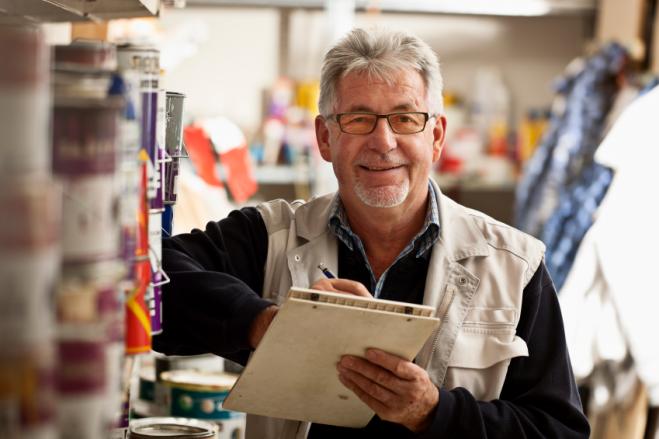Seniorpreneur: We need you

Australia needs its older workers and they want to contribute, but more is needed to end discrimination and encourage older people into business and workplaces
Published 30 March 2016
Australia’s burgeoning population of over 65s is healthy, active, well-educated and eager to contribute. But despite the Government encouraging older people to stay in the workforce longer to help overcome impending labour shortages as the population ages, we are still yet to put in place effective approaches to help them do this.
And we aren’t doing enough to abolish age discrimination.
The proportion of people in Australia aged 65 and over is forecast to rise from 14 per cent in 2012 to around 19 per cent by 2031. That is nearly a doubling in the number of 65-plus people from 3.2 million to 5.8 million. But while mature age unemployment in Australia is currently relatively low, older workers who lose their job tend to remain unemployed for significantly longer than younger workers.
Research shows that a quarter of job seekers aged 45 to 64 remain unemployed on average for more than a year, compared with only 15 per cent of job seekers aged 44 years or younger. The issue is even more acute for job seekers over 60, with two-thirds of job seekers in this age group being out of work for more than 12 months.

Many mature age job seekers report that their inability to obtain a job is directly related to age discrimination during the recruitment process, where older workers are screened out by agencies who state they are ‘overqualified’ for a position or ‘not the right fit’.
The Australian Human Rights Commission has described age discrimination in recruitment as ‘rampant’ and ‘systemic’.
Separate research shows that 36 per cent of mature age job seekers experienced discrimination in the form of exclusion during the job search process, which they attributed to age. And 67 per cent of mature age workers surveyed agreed it was a problem within the workplace.
In recognition of these perceptions – and in an attempt to address these experiences – age-friendly recruitment agencies have emerged which specialise in mature age job placement, such as Older Workers and Be Next. This is a commendable niche market, but it is also important to mainstream mature age employment as something that isn’t unusual nor undesirable.
Increase in self-employment
Mature age job seekers’ inability to secure employment due to age discrimination could well be the catalyst for the increase in self-employment we are seeing among older workers.
The emergence of the older entrepreneur, now commonly known as the ‘seniorpreneur’, is proving to be the fastest growing segment of new business owners in Australia. Almost 35 per cent of all new businesses are seniorpreneur start-ups.
With the average age of the seniorpreneur being 57, this goes a long way to dispel the ageist stereotype of the entrepreneur being a young, male, tech-savvy risk taker. The seniorpreneur is often well-placed to start their own business as they have had the opportunity to accumulate more financial capital, have well-established networks of great depth and breadth, have gained a wealth of experience and knowledge of skills, industries and management, and have the time to devote to a start-up.

Migrants and refugees, who also often face discrimination during the recruitment process, have a similar history of becoming self-employed, often by drawing on the transnational links they have established in both countries for import/export endeavours.
Unfortunately, there is evidence that these new ventures often take the form of self-employment as a way out of unemployment, rather than growth-oriented enterprises. It is saddening to realise that many Australians are pushed into entrepreneurship through necessity because of the discrimination they experience. It would be more desirable if they were pulled into entrepreneurship through a wealth of opportunity and choice.
Some may argue the seniorpreneur has more to lose with less time to recoup potential losses, but this does not appear to deter the new generation of risk takers. In comparison with other countries such as the US and UK, Australia lacks government support, for example entrepreneurship polices and initiatives for commodity and service markets. And the focus here is typically on younger entrepreneurs.
Targeted policy needed
As outlined in Per Capita’s Blueprint for an Ageing Australia, recommendations were proposed to the Government to enhance awareness of seniorpreneur opportunities as a late-career option.
It was suggested this could be achieved through the development of subsidised education, encouragement of mentorships, the provision of programs and tax incentives for seniorpreneur start-ups and launching awards for seniorpreneur innovation. A business incubator for seniorpreneurs could facilitate intergenerational business partnerships for mutual benefit.
Government policy supporting seniorpreneurship should also be accompanied by the development of an interdisciplinary research agenda which targets collaborations with industry. This will help to determine the needs of seniorpreneurs as well as identifying and targeting national and global market opportunities.
Dr Ruth Williams is the Academic Convenor of The Hallmark Ageing Research Initiative (HARI) that was created to foster and drive interdisciplinary research on ageing. She and HARI Co-Chair Associate Professor Briony Dow will present a seminar on HARI as part of the Graduate School Seminar Series on April 6, 12.30pm-1.30pm Seminar Room 515, Melbourne School of Population and Global Health, Level 5, 207 Bouverie Street, Carlton.
On Thursday March 31 the Melbourne School of Population and Global Health launches HARI and its new Master of Ageing course. Or take a look at our suite of ageing in society courses.
Banner image: iStock
